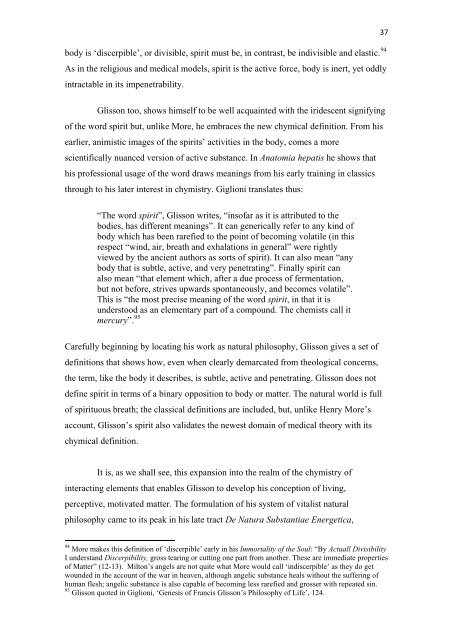Medical Science and the Anatomia Animata in Milton's Paradise Lost
Medical Science and the Anatomia Animata in Milton's Paradise Lost
Medical Science and the Anatomia Animata in Milton's Paradise Lost
Create successful ePaper yourself
Turn your PDF publications into a flip-book with our unique Google optimized e-Paper software.
ody is ‘discerpible’, or divisible, spirit must be, <strong>in</strong> contrast, be <strong>in</strong>divisible <strong>and</strong> elastic. 94<br />
As <strong>in</strong> <strong>the</strong> religious <strong>and</strong> medical models, spirit is <strong>the</strong> active force, body is <strong>in</strong>ert, yet oddly<br />
<strong>in</strong>tractable <strong>in</strong> its impenetrability.<br />
Glisson too, shows himself to be well acqua<strong>in</strong>ted with <strong>the</strong> iridescent signify<strong>in</strong>g<br />
of <strong>the</strong> word spirit but, unlike More, he embraces <strong>the</strong> new chymical def<strong>in</strong>ition. From his<br />
earlier, animistic images of <strong>the</strong> spirits’ activities <strong>in</strong> <strong>the</strong> body, comes a more<br />
scientifically nuanced version of active substance. In <strong>Anatomia</strong> hepatis he shows that<br />
his professional usage of <strong>the</strong> word draws mean<strong>in</strong>gs from his early tra<strong>in</strong><strong>in</strong>g <strong>in</strong> classics<br />
through to his later <strong>in</strong>terest <strong>in</strong> chymistry. Giglioni translates thus:<br />
“The word spirit”, Glisson writes, “<strong>in</strong>sofar as it is attributed to <strong>the</strong><br />
bodies, has different mean<strong>in</strong>gs”. It can generically refer to any k<strong>in</strong>d of<br />
body which has been rarefied to <strong>the</strong> po<strong>in</strong>t of becom<strong>in</strong>g volatile (<strong>in</strong> this<br />
respect “w<strong>in</strong>d, air, breath <strong>and</strong> exhalations <strong>in</strong> general” were rightly<br />
viewed by <strong>the</strong> ancient authors as sorts of spirit). It can also mean “any<br />
body that is subtle, active, <strong>and</strong> very penetrat<strong>in</strong>g”. F<strong>in</strong>ally spirit can<br />
also mean “that element which, after a due process of fermentation,<br />
but not before, strives upwards spontaneously, <strong>and</strong> becomes volatile”.<br />
This is “<strong>the</strong> most precise mean<strong>in</strong>g of <strong>the</strong> word spirit, <strong>in</strong> that it is<br />
understood as an elementary part of a compound. The chemists call it<br />
mercury”. 95<br />
Carefully beg<strong>in</strong>n<strong>in</strong>g by locat<strong>in</strong>g his work as natural philosophy, Glisson gives a set of<br />
def<strong>in</strong>itions that shows how, even when clearly demarcated from <strong>the</strong>ological concerns,<br />
<strong>the</strong> term, like <strong>the</strong> body it describes, is subtle, active <strong>and</strong> penetrat<strong>in</strong>g. Glisson does not<br />
def<strong>in</strong>e spirit <strong>in</strong> terms of a b<strong>in</strong>ary opposition to body or matter. The natural world is full<br />
of spirituous breath; <strong>the</strong> classical def<strong>in</strong>itions are <strong>in</strong>cluded, but, unlike Henry More’s<br />
account, Glisson’s spirit also validates <strong>the</strong> newest doma<strong>in</strong> of medical <strong>the</strong>ory with its<br />
chymical def<strong>in</strong>ition.<br />
It is, as we shall see, this expansion <strong>in</strong>to <strong>the</strong> realm of <strong>the</strong> chymistry of<br />
<strong>in</strong>teract<strong>in</strong>g elements that enables Glisson to develop his conception of liv<strong>in</strong>g,<br />
perceptive, motivated matter. The formulation of his system of vitalist natural<br />
philosophy came to its peak <strong>in</strong> his late tract De Natura Substantiae Energetica,<br />
94 More makes this def<strong>in</strong>ition of ‘discerpible’ early <strong>in</strong> his Immortality of <strong>the</strong> Soul: “By Actuall Divisibility<br />
I underst<strong>and</strong> Discerpibility, gross tear<strong>in</strong>g or cutt<strong>in</strong>g one part from ano<strong>the</strong>r. These are immediate properties<br />
of Matter” (12-13). Milton’s angels are not quite what More would call ‘<strong>in</strong>discerpible’ as <strong>the</strong>y do get<br />
wounded <strong>in</strong> <strong>the</strong> account of <strong>the</strong> war <strong>in</strong> heaven, although angelic substance heals without <strong>the</strong> suffer<strong>in</strong>g of<br />
human flesh; angelic substance is also capable of becom<strong>in</strong>g less rarefied <strong>and</strong> grosser with repeated s<strong>in</strong>.<br />
95 Glisson quoted <strong>in</strong> Giglioni, ‘Genesis of Francis Glisson’s Philosophy of Life’, 124.<br />
37
















